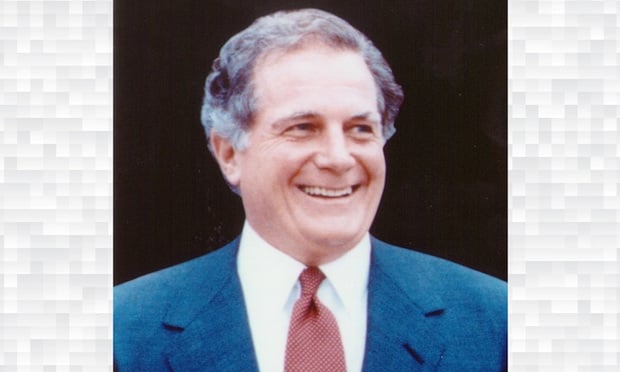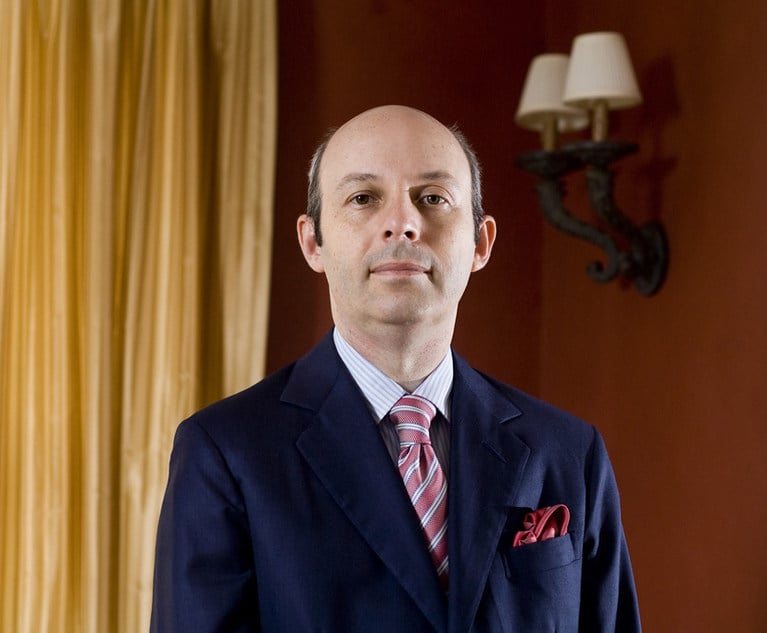Legendary Dallas Trial Lawyer Doug Mulder Dies
Doug Mulder, a legendary Dallas trial lawyer whose courtroom skills led him to have a hand in prosecuting and defending some of North Texas' most sensational…
January 16, 2018 at 03:57 PM
4 minute read

Doug Mulder, a legendary Dallas trial lawyer whose courtroom skills led him to have a hand in prosecuting and defending some of North Texas' most sensational criminal cases, died of a stroke Sunday. He was 79.
Mulder's courtroom talents were first noticed by former Dallas District Attorney Henry Wade, who hired Mulder out of Southern Methodist University law school in 1964. Mulder was hired months after Wade finished the successful prosecution of Jack Ruby for murdering accused presidential assassin Lee Harvey Oswald. Mulder quickly rose up the ranks from a misdemeanor prosecutor to the No. 2 in the office.
“He was made first assistant when he was 32 years old,” said Toby Shook, a Dallas criminal defense attorney who shared law office space with Mulder. “Wade has a stable of very good trial attorneys and he promoted Doug over them, that's how talented he was.''
“He's one of those legendary trial lawyers that had that confidence and ability to take total command of a courtroom,” Shook said. “He was a brilliant cross-examiner. Doug would dissect witnesses like a surgeon. He had a relentless approach in his preparation and he would overwhelm his opponents.''
Mulder was eventually handed some of Dallas' biggest criminal cases.
In 1973, Mulder and Wade convinced a Dallas jury to sentence two brothers to 5,005 years in prison for kidnapping Mandy Mayhew Dealey, then daughter-in-law of Joe Dealey, president of The Dallas Morning News at the time.
Later that same year, Mulder notched a murder conviction with malice against Darrell Cain, a Dallas police officer who shot 12-year-old Santos Rodriguez while he was interrogating the boy for theft. Cain was sentenced to five years in prison in a case that inflamed tensions within the city's Mexican-American population.
“It was quite an accomplishment in 1973 when it happened,” Shook said. “Because back then, most police officers didn't get indicted and they certainly didn't go to prison.''
Mulder also tried 20 capital murder cases and won the death sentence in all of them. The most notorious was Randall Dale Adams, a young drifter sentenced to death in the killing a Dallas police officer in 1976, a conviction that was overturned in 1989. Adams said he was wrongfully convicted and his story was turned into Errol Morris' noted 1988 documentary “The Thin Blue Line”—a film that helped prompt Texas courts to free Adams, along with the help of Houston criminal defense attorney Randy Schaffer.
In 1981, Mulder left the DA's office after he was approached to represent Bobby Joe Manziel, a wealthy Tyler oilman charged with capital murder in the death of a local grocer. Manziel, the great uncle of Heisman trophy winning quarterback Johnny Manziel, offered to double Mulder's salary to take the case. Mulder ultimately convinced prosecutors they couldn't win a conviction, and the charges were dropped.
Mulder's most famous case was his defense of Walker Railey, a prominent Dallas pastor who was accused of attempting to choke his wife to death. Railey's 1993 acquittal in a state district court in San Antonio came despite a mountain of circumstantial evidence offered by prosecutors, including a note the minister wrote complaining of a “demon inside my soul.”
“He was a legend, really and truly,” said Dan Hagood, a Dallas criminal defense attorney who knew Mulder. “The word gets misused a lot. But the likelihood of another Doug Mulder coming around in my lifetime is not possible.''
Mulder's greatest joy was practicing law with his children—first his daughter Michelle, who has since retired, and later with his son Chris.
In 1999, Mulder and his son defended a burglar convicted for stealing over $1 million in jewelry from the home of the late Harold Simmons, a Dallas billionaire. While the burglar was exposed to a life sentence, the Mulders convinced a jury to sentence him to 10 years of probation.
“Doug told me that Chris was smarter than him and was much calmer in trial. Doug just liked to eviscerate witnesses on the stand,'' Shook said.
In 2009, Chris Mulder shared some fatherly advice he learned from his dad in an article in Texas Lawyer.
“He told me before I was a lawyer and even now: 'I believe I am smarter than 90 percent of the lawyers out there, but the other 10 percent you just have to outwork' and 'be nice to everybody because you don't know who's going to be a judge next year,' ” Mulder said of his father.
Funeral services for Mulder are pending.
This content has been archived. It is available through our partners, LexisNexis® and Bloomberg Law.
To view this content, please continue to their sites.
Not a Lexis Subscriber?
Subscribe Now
Not a Bloomberg Law Subscriber?
Subscribe Now
NOT FOR REPRINT
© 2025 ALM Global, LLC, All Rights Reserved. Request academic re-use from www.copyright.com. All other uses, submit a request to [email protected]. For more information visit Asset & Logo Licensing.
You Might Like
View All
SCOTUSblog Co-Founder Tom Goldstein Misused Law Firm Funds, According to Federal Indictment
2 minute read
Read the Document: DOJ Releases Ex-Special Counsel's Report Explaining Trump Prosecutions
3 minute read

Trending Stories
- 1No Two Wildfires Alike: Lawyers Take Different Legal Strategies in California
- 2Poop-Themed Dog Toy OK as Parody, but Still Tarnished Jack Daniel’s Brand, Court Says
- 3Meet the New President of NY's Association of Trial Court Jurists
- 4Lawyers' Phones Are Ringing: What Should Employers Do If ICE Raids Their Business?
- 5Freshfields Hires Ex-SEC Corporate Finance Director in Silicon Valley
Who Got The Work
J. Brugh Lower of Gibbons has entered an appearance for industrial equipment supplier Devco Corporation in a pending trademark infringement lawsuit. The suit, accusing the defendant of selling knock-off Graco products, was filed Dec. 18 in New Jersey District Court by Rivkin Radler on behalf of Graco Inc. and Graco Minnesota. The case, assigned to U.S. District Judge Zahid N. Quraishi, is 3:24-cv-11294, Graco Inc. et al v. Devco Corporation.
Who Got The Work
Rebecca Maller-Stein and Kent A. Yalowitz of Arnold & Porter Kaye Scholer have entered their appearances for Hanaco Venture Capital and its executives, Lior Prosor and David Frankel, in a pending securities lawsuit. The action, filed on Dec. 24 in New York Southern District Court by Zell, Aron & Co. on behalf of Goldeneye Advisors, accuses the defendants of negligently and fraudulently managing the plaintiff's $1 million investment. The case, assigned to U.S. District Judge Vernon S. Broderick, is 1:24-cv-09918, Goldeneye Advisors, LLC v. Hanaco Venture Capital, Ltd. et al.
Who Got The Work
Attorneys from A&O Shearman has stepped in as defense counsel for Toronto-Dominion Bank and other defendants in a pending securities class action. The suit, filed Dec. 11 in New York Southern District Court by Bleichmar Fonti & Auld, accuses the defendants of concealing the bank's 'pervasive' deficiencies in regards to its compliance with the Bank Secrecy Act and the quality of its anti-money laundering controls. The case, assigned to U.S. District Judge Arun Subramanian, is 1:24-cv-09445, Gonzalez v. The Toronto-Dominion Bank et al.
Who Got The Work
Crown Castle International, a Pennsylvania company providing shared communications infrastructure, has turned to Luke D. Wolf of Gordon Rees Scully Mansukhani to fend off a pending breach-of-contract lawsuit. The court action, filed Nov. 25 in Michigan Eastern District Court by Hooper Hathaway PC on behalf of The Town Residences LLC, accuses Crown Castle of failing to transfer approximately $30,000 in utility payments from T-Mobile in breach of a roof-top lease and assignment agreement. The case, assigned to U.S. District Judge Susan K. Declercq, is 2:24-cv-13131, The Town Residences LLC v. T-Mobile US, Inc. et al.
Who Got The Work
Wilfred P. Coronato and Daniel M. Schwartz of McCarter & English have stepped in as defense counsel to Electrolux Home Products Inc. in a pending product liability lawsuit. The court action, filed Nov. 26 in New York Eastern District Court by Poulos Lopiccolo PC and Nagel Rice LLP on behalf of David Stern, alleges that the defendant's refrigerators’ drawers and shelving repeatedly break and fall apart within months after purchase. The case, assigned to U.S. District Judge Joan M. Azrack, is 2:24-cv-08204, Stern v. Electrolux Home Products, Inc.
Featured Firms
Law Offices of Gary Martin Hays & Associates, P.C.
(470) 294-1674
Law Offices of Mark E. Salomone
(857) 444-6468
Smith & Hassler
(713) 739-1250






